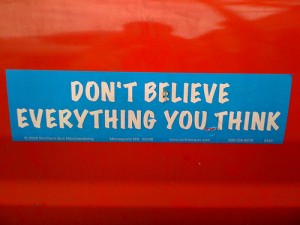 Cognitive Behavioral Therapy is a theory and practice of psychology that focuses on how we think and perceive our world, and how these perceptions can change our experiences. This field has identified common mistakes people make (more information from Wikipedia here.) These types of thinking errors are called cognitive distortions.
Cognitive Behavioral Therapy is a theory and practice of psychology that focuses on how we think and perceive our world, and how these perceptions can change our experiences. This field has identified common mistakes people make (more information from Wikipedia here.) These types of thinking errors are called cognitive distortions.
I want to write about cognitive distortions as they relate to your career. You would not guess how many times I have heard a student say “there are no jobs in my field” or “it is impossible to find an internship now” – something along those lines. Of course, the student and I both know that the statement is generalizing, may even be hyperbolic. Yes it is hard to find work, but are there NO job openings whatsoever, even since the economic downturn in 2008? I haven’t met a single person who would take their own emphatic statement as the full truth.
So what’s wrong about making an exaggerated exclamation? Well… the problem is that we often start to believe our own distortions, or use the feeling associated with them to guide our behavior. Even if you know there are SOME jobs out there for you, if you go with the feeling such a statement might generate or enforce (frustration, helplessness) you are bound to stop trying when in fact, persevering in your networking or other job search efforts might be the name of the game. My suggestion is to be aware of the messages you convey to yourself – think about if they are helping you, or may be making things worse.
Below are a few statements that may seem familiar, the cognitive distortion involved (From: Burns, David D., MD. 1989. The Feeling Good Handbook. New York: William Morrow and Company, Inc.), and an alternative that might be more helpful:
“I am so frustrated – there are no jobs in my field.” Emotional reasoning: You assume that your negative emotions necessarily reflect the way things really are: “I feel it, therefore it must be true.” Possible alternative: “I feel frustrated right now. I am going to focus on sticking to my strategy and getting some support from Career Services.”
“I can’t believe I messed up that one question at the interview, I am sure that ruined my chances of getting to the second round.” Mental filter: You pick out a single negative detail and dwell on it exclusively so that your vision of all reality becomes darkened, like the drop of ink that discolors the entire beaker of water. Possible alternative: “My answer to that one question kind of stank, but the rest of the interview went pretty well. I need to practice in case I get that question again.”
“If I can’t become a professor I am going to have to wait tables – what else is there for PhDs?” All-or-nothing thinking: You see things in black and white categories. If your performance falls short of perfect, you see yourself as a total failure. Possible alternative: “I don’t know what I am qualified for besides being an academic; maybe I should explore my options.”
“Nothing came of my contacts at that career fair, I don’t know how I am ever going to get a job.” Overgeneralization: You see a single negative event as a never-ending pattern of defeat. Possible alternative: “That career fair was a disappointment, so I am going to look into other strategies for my job search.”
“I still haven’t heard back regarding the job application. I must have done something wrong.” Personalization: You see yourself as the cause of some negative external event for which, in fact, you were not primarily responsible. Possible alternative: “There are many factors that affect a hiring decision, I wonder if they need more time to decide or more information from me.”
When you are job searching, as in other parts of your life, your attitude can affect your outcomes. Make sure you are serving yourself well when you reflect on your own thoughts and behaviors. If you are interested in learning more about cognitive therapy and working on cognitive distortions, I suggest you read books by Dr. David Burns, Dr. Aaron Beck, and learn about the work at the University of Pennsylvania’s Center for Cognitive Therapy .










